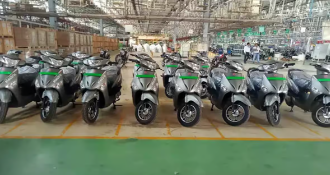The Union Cabinet approved a new electric vehicle subsidy scheme, PM Electric Drive Revolution in Innovative Vehicle Enhancement (PM E-Drive), which will reduce the cost of electric two-wheelers by up to Rs 10,000 per unit. Minister for Heavy Industries HD Kumaraswamy announced the details, revealing that the subsidy will provide Rs 5,000 per kWh for up to Rs 10,000 in the first year, and Rs 2,500 per kWh for the same amount in the second year.
The scheme excludes electric buses, for which no subsidy decision has been made yet. With an overall outlay of Rs 10,900 crore over two years, PM E-Drive aims to boost the adoption of electric vehicles, especially two- and three-wheelers, in India.
The program will support 24.79 lakh electric two-wheelers, 3.16 lakh electric three-wheelers, and 14,028 electric buses. However, electric cars and hybrid vehicles are excluded due to existing benefits, such as a lower GST rate and the Auto PLI scheme.
The government is targeting a 10% electric vehicle penetration for two-wheelers and 15% for three-wheelers under this scheme. The focus remains on promoting smaller electric vehicles while excluding passenger cars.
The scheme’s largest allocation, Rs 4,391 crore, is reserved for electric buses, followed by Rs 1,772 crore for two-wheelers and Rs 907 crore for three-wheelers. Additionally, Rs 500 crore has been set aside for hybrid ambulances.
To ensure seamless subsidy disbursement, buyers will receive e-vouchers linked to Aadhaar at the time of purchase, preventing leaks and delays in subsidy benefits.
A key part of PM E-Drive is its emphasis on expanding charging infrastructure, addressing one of the biggest challenges for electric vehicle adoption. The plan includes installing 22,100 fast chargers for electric cars, 1,800 for buses, and 48,400 for two- and three-wheelers, with an outlay of Rs 2,000 crore.
PM E-Drive succeeds the FAME-II scheme, which ran for five years until March 2024, and impacted over 1.3 million EVs with an outlay of Rs 11,500 crore. Despite its success, FAME-II only resulted in the installation of 2,700 charging points, highlighting the need for the enhanced infrastructure proposed under PM E-Drive.
The Rs 500-crore Electric Mobility Promotion Scheme 2024 will conclude on September 31, paving the way for the rollout of PM E-Drive.
